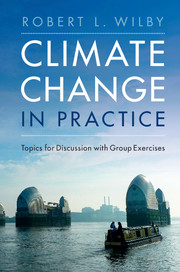Book contents
- Climate Change in Practice
- Reviews
- Climate Change in Practice
- Copyright page
- Dedication
- Contents
- Preface
- Acknowledgements
- 1 What Is the Global Mean Temperature and How Has It Changed?
- 2 Why Does Climate Change?
- 3 What Does It Take to Build a Model of the Climate System?
- 4 How Trustworthy Are Climate Models?
- 5 What Is the Purpose of Regional Climate Downscaling?
- 6 What Is the ‘Cascade of Uncertainty’ and Why Does It Matter?
- 7 What Shapes Climate Vulnerability?
- 8 When Are Climate Forecasts Good Enough to Take Action?
- 9 Who or What Is Most at Risk from Climate Change?
- 10 How Can Urbanites Avoid Becoming Climate Victims or Villains?
- 11 What Is Dangerous Climate Change?
- 12 Why and How Are Carbon Footprints Measured?
- 13 How to Decarbonise Economies?
- 14 How Is It Possible to Adapt to an Uncertain Climate?
- 15 Could or Should Humankind Geoengineer Earth?
- 16 How Is Climate Change Communicated?
- 17 Who Are Climate Experts?
- 18 How Connected Is Climate Change to Other Global Challenges?
- References
- Index
- References
9 - Who or What Is Most at Risk from Climate Change?
Published online by Cambridge University Press: 28 April 2017
- Climate Change in Practice
- Reviews
- Climate Change in Practice
- Copyright page
- Dedication
- Contents
- Preface
- Acknowledgements
- 1 What Is the Global Mean Temperature and How Has It Changed?
- 2 Why Does Climate Change?
- 3 What Does It Take to Build a Model of the Climate System?
- 4 How Trustworthy Are Climate Models?
- 5 What Is the Purpose of Regional Climate Downscaling?
- 6 What Is the ‘Cascade of Uncertainty’ and Why Does It Matter?
- 7 What Shapes Climate Vulnerability?
- 8 When Are Climate Forecasts Good Enough to Take Action?
- 9 Who or What Is Most at Risk from Climate Change?
- 10 How Can Urbanites Avoid Becoming Climate Victims or Villains?
- 11 What Is Dangerous Climate Change?
- 12 Why and How Are Carbon Footprints Measured?
- 13 How to Decarbonise Economies?
- 14 How Is It Possible to Adapt to an Uncertain Climate?
- 15 Could or Should Humankind Geoengineer Earth?
- 16 How Is Climate Change Communicated?
- 17 Who Are Climate Experts?
- 18 How Connected Is Climate Change to Other Global Challenges?
- References
- Index
- References
- Type
- Chapter
- Information
- Climate Change in PracticeTopics for Discussion with Group Exercises, pp. 141 - 159Publisher: Cambridge University PressPrint publication year: 2017
References
9.4 Further Reading
9.5 Other Resources
Birdlife International on the Djibouti francolin (Pternistis ochropectus) www.birdlife.org/datazone/species/factsheet/22678869 [accessed 14/07/16]
Republic of Djibouti National Adaptation Plan of Action 2006 (in French) http://unfccc.int/resource/docs/napa/dji01f.pdf [accessed 14/07/16]
UK Climate Change Risk Assessment 2017 www.theccc.org.uk/tackling-climate-change/preparing-for-climate-change/climate-change-risk-assessment-2017/ [accessed 14/07/16]
United Nations Country Profile for Djibouti http://data.un.org/CountryProfile.aspx?crName=DJIBOUTI [accessed 14/07/16]
US National Climate Assessment 2014 http://nca2014.globalchange.gov/ [accessed 14/07/16]
World Wildlife Fund (2009) notes on the Ethiopian Montane Woodland ecoregion www.worldwildlife.org/ecoregions/at0112 [accessed 14/07/16]
- 1
- Cited by



